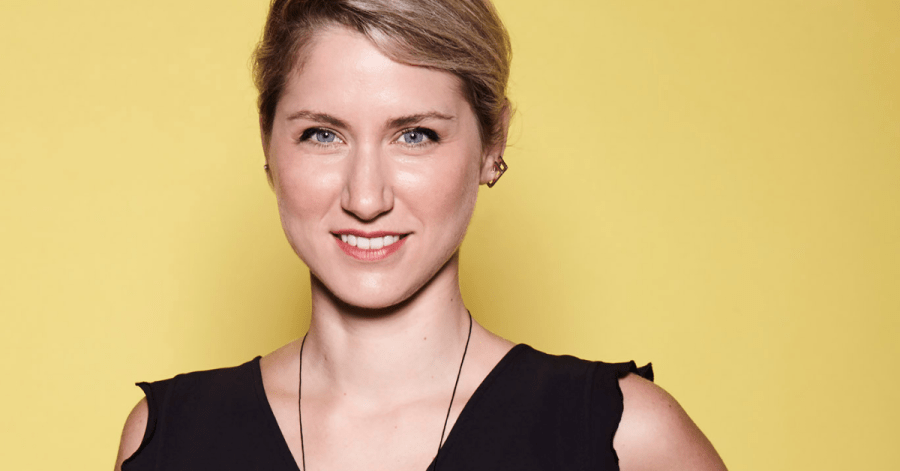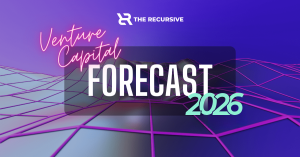Media and academia – two vast realms that one wouldn’t necessarily connect together at first thought. Add up innovations, venture capital, and investing and this is the intersection where you’ll find our next guest at. Meet Denise Xifara – an award-winning Oxford Ph.D. lecturer turned VC. Denise is a co-founder and investor at GMG Ventures, an early stage, thematic investor, focused on the news, media, and entertainment sector.
GMG Ventures invests in companies seeking to fundamentally re-shape their rapidly evolving industry and adjacent sectors. Bringing an eclectic mix of academic background at Oxford with awards from the American Society of Human Genetics and the Leventis Foundation, her path switched to teaching and advising corporates in the fields of coding, AI, data governance, data strategy, and other technical skills.
Dr. Xifara has worked closely with numerous start-ups, building AI, blockchain and chatbot applications, and will speak at the upcoming TEDxAthens event on May 28th.
The Recursive spoke to Denise Xifara to find out what she thinks about:
- The business and economic models forward for media companies
- What are the principles of building a truly disruptive company
- How to get the best out of a startup-VC relationship
- How can founders impress an investor
The Recursive: You are an academic at Oxford with awards from the American Society of Human Genetics and the Leventis Foundation. How did you get into investing and supporting innovations at GMG Ventures?
Denise Xifara: Following academia, I was involved in the tech industry. I worked as a data scientist, building different types of products within the Internet services industry more broadly speaking. Apart from building products, I was also working with corporates, so I had to think lots about their product roadmap and go to market customer engagement.
And I was also very excited about how technology could be put to good use. How coders and builders could use different tools and monitoring products to also build lots of different types of products very differentiated, very disruptive, that were really changing how businesses operated. That was my interest and my passion and so co-founding GMG Ventures was really an opportunity to do more of that at scale.
GMG Ventures specializes in Media Tech, those types of technologies that influence consumer and citizen experience, but also enterprise digitization. It’s a space that is rapidly evolving because of all of these technologies and the R&D going into the space and because of how consumer demand has been evolving and, enterprise always needs more innovation, more digitization. Regulation is very influential in this space. The founders that we meet are very active. They’re thought leaders, they’re builders, they’re visionaries, and for me, it’s really exciting to meet them and learn from them, but also to support their growth.
There’s a sense as an investor that you’re contributing to the change that they’re bringing to the market. And then the other aspect was very much the opportunity to strengthen ESG at the early stage. We were thinking about ESG and different topics within ESG since the inception of the fund. This results in a particular focus on responsible technology, which is very much underlooked. There was a particular gap on the market around data and privacy, fairness AI and AI robustness, and responsible product design. It was exciting to think about this and put it into action a little bit more.
What have been the most impactful challenges and moments you’ve encountered in your career as a VC investor?
You used the word challenge, and so obviously, the first thing that came to mind, like what’s really defined the last few years, has been COVID. It undeniably has been the biggest challenge, because it’s several emergencies happening simultaneously. Obviously, first and foremost from a team perspective, you have to think about everyone’s safety. The whole world obviously had this challenge, but within our micro-ecosystem of the startup world, we needed to grapple with it in our own way.
And then there was suddenly a very new commercial risk to think about when it came to our portfolio. Some companies were affected more or less compared to others. But on the whole, you really had to do a lot of thinking at the same time for different companies around how they needed to change their strategy, so that a market plan, product roadmap, actually pivoting the product or changing the product very quickly and also not knowing the timeframe within which you need to act.
Then there was the fundraising aspect as well. Many companies had to rethink their cost base or fundraising strategies, their relationships with investors and so on.
You’re in this business because you feel passionate about what your companies do. And so of course, it’s impactful when it plays out and when they’re successful and you’ve been part of their growth journey. It’s very rewarding, whether it’s making an amazing hire that they’ve been wanting to do, or if they’ve managed to sell to a really high profile client, and it’s a validation of their thesis and their value proposition, or if they moved to another market. So all of these wins, they’re noteworthy and you’re very happy about them.
As GMG Ventures is focused on the media and entertainment industry, have you come across any truly disruptive business models or sustainable economic models that are the way forward for media companies?
New business models, it is fascinating, right? It’s one of the reasons why our space at GMG Ventures is exciting. Especially for content businesses, it’s been historically a very big problem how to monetize. We’re definitely seeing lots of different things going on in the market.
A common theme is thinking about adjacent business models for media companies. Media companies have a lot of expertise. They have a lot of authority, they get a lot of trust from their readers. So they’re very well positioned to think about launching research projects or insights products or licensing their content in innovative ways. More sophisticated media monitoring, for example. I wouldn’t say that these ideas are new, but certainly, because of technology, easier visualization, data analytics, or natural language processing, they’re certainly new ways of doing these things that can lead to new revenue.
I think Web3 is very exciting when it comes to subscription, which is also helping media companies monetize. You can use non-fungible tokens in a really innovative way to run subscription products that can be interoperable and work across platforms., I think this has been a problem – how do you continue to monetize your audience or engage with your audience if they are not on your website or for example, if they’re on WhatsApp or another social media platform, etc.
There’s also a lot of thinking around repackaging content in interesting ways. So, if you’re a content owner, you can write an article or you can have a newsletter, but actually, there’s a lot more that you can do with your content. You can break it up, you can convert it into educational content. It can be distributed in short form into environments and engage different types of audiences in new ways. Underneath all of it is the same content but you’ve packaged it up differently for different audiences.
A final example that came to mind was the creator economy and thinking about younger audiences, which I think still remains a challenge for many media companies. So how do you approach younger audiences in the environments that are native to them, which typically means on platforms and social media? How do you leverage the influencers and the creators that have the reach to engage them and convey important messages? We’ve seen some examples where that has worked quite well. In general, the ingredients for success, oftentimes come down to the team, right. The quality of the management team – you want to see people that are strong leaders, that are very dedicated, have a lot of conviction, have a lot of passion, but then also balance that with being adaptive and taking feedback and responding to changing markets, which is quite a challenging mix, I’d say, for founders. At the end of the day, I think they need to be leaders and need to be able to hire great teams and be inspiring and, hopefully, that helps them achieve scale. I think these are really necessary ingredients, you have to think big and persevere if you want to impact the market.
Do you find resemblance in the most impactful innovations and the most resilient tendencies that you have come across in your work?
I was intrigued by your question because I was thinking, “What sort of business impacts the market?” and I thought there are probably two types of businesses. The first is the type of business that is disrupting the status quo. Classic examples would be Google and Amazon. It was an existing market for them, but a completely new way of delivering their service at the time they were founded. And then the other type of business would be one that is not so much about disruption as much as actually creating a new market, a market that wasn’t there before, that now you can create because of technology. The classic examples there would be Airbnb and Uber. To end up being in one of those two categories, you need to have these qualities that I mentioned before – you need to have the perseverance, but also the adaptability and to inspire others as well.
What is the first thing that catches your attention in a startup pitch and when assessing a potential investment?
I know you’ve asked for one but I will give you three because I couldn’t choose between them. So, there are many criteria, but what are the three core things for me? First, the team. You want to feel that they’re experts and they’re passionate that they’ll win. The second is the market. It comes down to “Do we think it’s an exciting market where there are gaps, where the incumbents are not innovating very quickly? Is there an exciting market opportunity in it for technology to be impactful?” The third is values and alignment. We need to feel happy that this product really exists in the world and it doesn’t have to be an impact product. It should certainly not feel uncomfortable. So if these three aren’t true, it’s unlikely that we would meet and ask for another call.
How do you think VCs and investors should be involved in a start-up’s journey to improve the success rate of startups?
Startups do have a high failure rate at the early stage. Failure rate is relative depending on where you are in the growth journey. I think it’s just part of experimenting, it’s not necessarily bad. This sort of “Fail faster,” is a bit wasteful, but equally, there’s value in experimenting and knowing when to stop. That said, I think a lot of things have to go well for startups to work – the team, its market timing and market positioning and go-to-market strategy and plan, how you orchestrate your first-year plan, versus year two and year three and the hiring and the scheduling that will go into that. The product, of course, you really have to think about differentiation and uniqueness and scalability early on, and then also how the product roadmap should evolve. Fundamentally you need to be solving a legitimate problem in a way that makes financial and commercial sense. So a lot of things have to come together for this to go well.
In terms of the VCs role most recently it’s becoming more and more common for VCs to add value. I think founders definitely want VCs that add more value. But I also think VCs have more appetite to add value, it was less common a few years ago. It’s definitely a shift.
And I think VCs can add value in different ways. Certainly, GMG Ventures thinks of its strategy this way. For us, an investment is building a partnership. We absolutely think of ourselves as an investor who wants to dedicate the time, who actually wants to get to know founders really well and be part of the journey, feel excited about what they’re doing and then feel that reward when it’s becoming successful. We’re trying to add value in different ways whether it’s by giving feedback, whether it’s on strategy or product, whether it’s commercial introductions, whether it’s thinking about governance, whether it’s thinking about fundraising. I agree it may improve the failure rate to get support from the investors. I don’t know if it will go down from 70% to 10% though, fundamentally it comes down to everything else also coming together. Although VCs can be very impactful, there are all those other parameters that need to factor in as well.
From a founder’s perspective, they certainly ask for smart money more and more these days. I think it’s also interesting to think about how you combine different types of investors that might bring different strengths, and be quite complimentary.
Would you mind giving a glimpse to our audience about what are the latest initiatives and projects you are working on and supporting?
GMG Ventures focuses on the UK market, so I have to say I’ve been witnessing the growth of the Greek ecosystem from the sideline. But it’s certainly been very exciting, I think it’s very active and fantastic that it’s gaining more momentum and growing in prominence within Europe.
What we’ve been focusing on from an investment perspective, there are a few areas that are actually really exciting. We’ll talk about them on Saturday, I hope. The first is what we call content intelligence, which is what AI can do with content. Natural language processing, computer vision, voice tech, VR, AR, etc., which is a very exciting space and still a lot of R&D going into it. The second space is Web3 and content tokenization as well as DAOs for new ways of community engagement. This is a newer market, certainly a very hyped market, but a very exciting one, nonetheless. And then finally, virtual economies and what that means for enterprise, so things like privacy tech or synthetic data generation. Apart from this, it’s worth highlighting that GMG Ventures actually has co-founded an entity called VentureESG which is a not for profit, that’s aiming to build and bring together a lot of the community VCs, who have been building bottom-up best practices around ESG in early-stage venture, which was а big gap in the market. The objective is to provide resources and education specific to VCs and also to put together materials that can support VCs end-to-end in their operations in ESG. We’re really trying to make ESG accessible and practicable and meaningful for small VCs and startups. And facilitate transparency and accountability which is largely missing at the moment in our industry.








